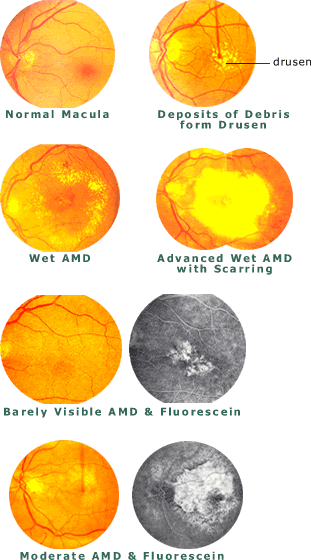What is Age-Related Macular Degeneration (ARMD)?
- Genetically determined weakening of the cells in the central retina called macula
- Deterioration of cones, rods and retinal pigment epithelial cells
- Cellular malfunction and death
What are the Symptoms?
- Early stages are asymptomatic or show diminished adjustment from light to dark
- As the condition progresses blurring and reading difficulties begin
- Generally the progression is very slow
- In late phases all central vision is lost
 Description: Normal vision.Credit: National Eye Institute, National Institutes of Health |
 Description: A scene as it might be viewed by a person with Age-Related Macular Degeneration.Credit: National Eye Institute, National Institutes of Health |
The Cell Story
- RPE cells have a very high rate of metabolism and oxidation
- Rods and cones create metabolic debris which cells have to remove or die from choking
- Deposits of debris form Drusen is an early sign of Age-Related Macular Degeneration
Molecular Level
- High PUFA (polyunsaturated fatty acids) content in the retinal cells
- PUFA oxidize under influence of light and oxygen and release free radicals
- Ultraviolet and blue wave lengths promote oxidation
What are the Retinal Natural Antioxidants?
- Vitamins E and C and Glutathione
- Enzymes superoxide Desmutase and Glutathione Peroxidase
- Carotenoids Zeaxanthin and Lutein
- Beta Carotene is not normally present in the eye
Learn about the ingredients in Horizon Complete.
Types of Macular Degeneration
- Drusen and early pigment
- Dry Macular Degeneration
- Wet Macular Degeneration
- Hemorrhagic form
- Disciform or scarred form

Early Dry ARMD
- For diagnosis need complete eye examination
- 90% of all Macular Degeneration cases remains dry
Wet or Hemorrhagic ARMD
- 10 to 15% of patients with Macular Degeneration will develop Wet Stage
- Most will progress to Hemorrhagic Stage and then later to Cicatritial StageThese statistics are improving as more people are getting educated and applying what they learn.
Other Recommended Web Sites
- Sebastopol Specialty Center Eye Care Providers – Information on the Ophthalmologists who formulated Horizon Complete
- ARED’s National Eye Institute Health Website
ARMD Study Results | Press Release
